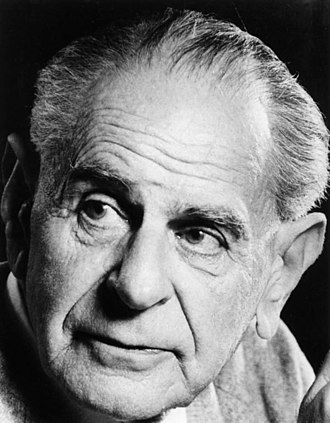In a college or university, you’ll probably find the chemistry, biology, and physics departments grouped under the School of Science, but the psychology department is usually stuck in the School of Arts and Social Science. This begs the question: Is psychology not a *real* science?
The answer is complicated, and if you love a good flame war, you’re in for a treat. Here are my quick thoughts on the debate, written for a general audience.
What Makes a Science "Hard"?
If you've not picked up a paper or textbook since school, you might remember how you did an experiment in physics or chemistry and then replicated it again and again and again. This is why for many people, "science" involves:
Clearly defined terminology.
Karl Popper, serious brain. - A falsifiable hypothesis (if you love Karl Popper, and who doesn’t?).
- A tightly controlled experiment to test the theory.
- Being able to observe, quantify, and record results accurately.
- The ability to reproduce the results.
Psychology isn’t like that. There are no universally agreed-upon definitions for depression, happiness, or stress. Even observing them can be tricky.
This is why people often refer to chemistry, biology, and physics as “hard science” and psychology as “soft science.” In such discussions, there’s often a bit of sneering, with the idea that soft science is somehow a bit grubby, a kind of parlor trick.
The Myth of "Hard" Science
However, hard science is in poor supply. If you keep an eye on the news, you’ll see that biologists argue over what kinds of cells qualify as stem cells, chemists argue over how to classify crystals, and physicists are still arguing over quantum mechanics theory 90 years after it was first published, debating whether empirical evidence is even necessary for their ideas at all.
And let’s not talk about how scientific medicine is, or we’d be here all day!
For me, the issue isn’t who has the hardest science. What I’m interested in are investigations into human nature that tell us something about ourselves.
Psychological research deals with challenging topics that affect us all. Like, why do we rush to help if it’s just us and them, but we’ll maybe stand back if there are fifty of us? And why does a great piece of good fortune coming our way not make us permanently happy?
We have some ideas about why these things happen, but they are controversial—meaning that some studies are hard to replicate. While psychological research isn’t perfect, we’re doing some good work at understanding ourselves.
The Art of Evidence-Based Practice
Ideally, everything we do should be revealing in some universal way. But given the difficulties involved in this field, I think that any kind of insight is useful. If someone can provide information that only applies to a particular group, like Scottish nuns aged 25 to 40, that’s okay. As long as it helps someone, and we're all clear about limitations and caveats, I’m all for it.
We become attached to ideas, even when these are pseudoscience or old ideas proven wrong. However, part of being a professional therapist is a) keeping up with the science, and b) making sure that clients are not working with theories and practices that have been disproven.
Part b is an art. When you tell someone that one of their favourite theories is disproven or is pseudoscience, they can be upset or even angry. I tell my clients anyway because I believe we need to make informed decisions.
Also, I try to avoid long conversations about why a theory is disproven. I do this because my clients are paying for sessions, not a class in psychology. So typically I say something like, "That is something we used to think but we've moved on from there. Today we think XYZ," and if the client asks, I send them a link to an article.
Clients often ask me, "How can I tell what's current, what's outdated and what's just TikTok blah blah?" and honestly the answer is, "It's not easy!"
I believe that what really matters is critical thinking. When it comes to therapy, you need to have a good grasp of the field, and to be clear, rational, open-minded, and informed by evidence when it comes to practice.
I have seven years of university education, so I'm **Ellen Whyte, BSc Psych (Hons), MCouns (Dist)**, which means I have a Bachelor's with Honours in Psychology and a Master's with Distinction in Counselling.
I have an additional 10 years of work experience, plus I read two or three journal articles a week, and I talk to researchers and colleagues in different areas such as medical doctors, social workers, and community nurses. Sometimes I take courses or attend conferences.
Keeping up to date is part of the job. I am a healer, and as psychology is an evolving science, and healing is always part art, part science, I am always mindful of that fundamental ancient principle: **do no harm**.
If you value clear thinking and evidence-based support, you’re in the right place. I offer private online therapy for professionals who want real insight—not fluff. Message me today via email ellen.whyte@gmail.com or WhatsApp: +44 7514 408143 for your free 15-minute consultation.

